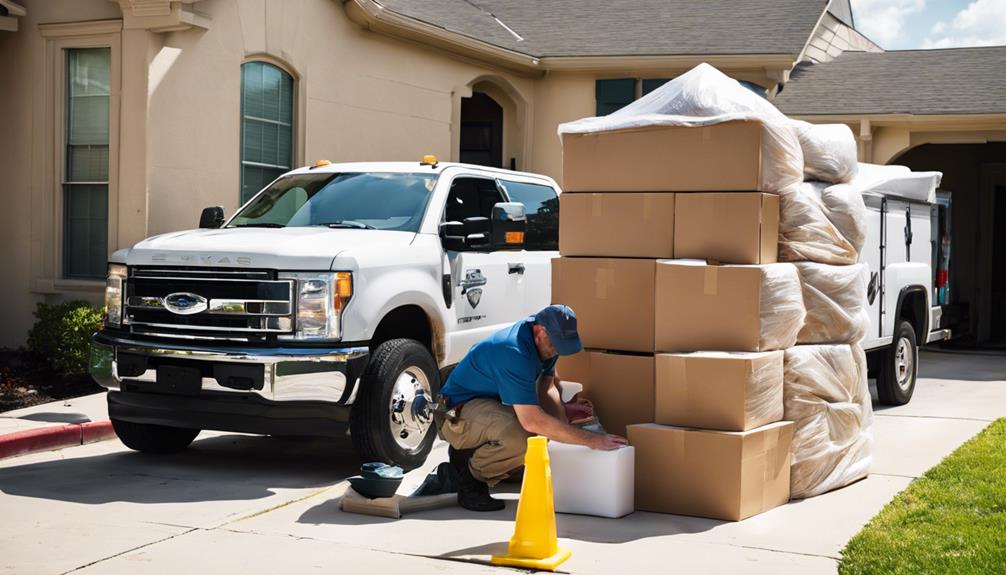If you're considering hiring a moving contractor in San Antonio, it's crucial to understand the significance of the moving contractor bond. This bond not only acts as a financial safety net for you but also demonstrates a contractor's commitment to professionalism and adherence to state regulations. Knowing how to verify this bond can make a significant difference in your moving experience. But what exactly should you look for, and how can this bond protect you from unforeseen issues during the move?
Understanding the Moving Contractor Bond

Understanding the moving contractor bond is crucial for anyone looking to hire a moving company. This bond serves as a financial guarantee that the moving company will adhere to state regulations and fulfill its obligations during the moving process. Essentially, the bond protects you, the consumer, from potential losses due to mishaps or negligence on the part of the mover.
In many states, the surety bond is required to help ensure that moving contractors comply with industry standards and provide reliable services, making the financial protection for the public a key aspect of the bonding process.
When you hire a moving company, you want to ensure they're licensed and insured. A bond acts as an additional layer of security, showing that the company is committed to ethical practices. If a mover fails to deliver your belongings or causes damage, you can file a claim against the bond. This means you won't have to bear the full financial burden of any issues that arise.
It's important to check if the moving company you're considering has a valid bond. You can usually find this information on their website or by asking them directly. Knowing that a moving contractor bond is in place can give you peace of mind, knowing you're working with a reputable company that values accountability and responsibility.
Importance of the Bond
The importance of a moving contractor bond can't be overstated, especially when you're entrusting your belongings to a company. This bond acts as a safety net, ensuring that you're protected against potential damages or mishaps during your move. If something goes wrong, whether it's lost items or damage to your property, the bond provides a way for you to seek compensation.
Additionally, a well-structured bond process, as outlined by surety bond services, ensures that you're supported throughout the moving experience.
Having a bond in place also reflects a contractor's commitment to professionalism and accountability. It shows that they take their responsibilities seriously and are willing to stand by their service. When hiring a moving company, you want peace of mind knowing that they've met the necessary standards and are financially backed to cover any potential issues.
Moreover, a bond can enhance your overall moving experience. It encourages contractors to perform at their best, knowing that their reputation is on the line. For you, this means more reliable service and fewer worries about the safety of your belongings.
In short, a moving contractor bond isn't just a legal formality; it's a crucial element that protects you and fosters trust in your moving experience.
Legal Requirements in Texas

In Texas, moving contractors must meet specific legal requirements to operate legally and protect consumers. First, you need to obtain a Texas moving company license. This involves submitting an application to the Texas Department of Motor Vehicles (DMV) and providing necessary documentation, such as proof of insurance and a surety bond.
The bond ensures that you can cover any claims related to damages or losses during a move, including various types of Texas Surety Bonds that may be applicable to your business operations.
Additionally, you're required to maintain adequate insurance coverage, including liability and cargo insurance. This protects both you and your clients in case of accidents or damages.
It's crucial to familiarize yourself with the Texas Administrative Code, which outlines regulations specific to the moving industry, including consumer rights and responsibilities.
You also need to ensure that all your employees are trained and aware of safety procedures to minimize risks during operations.
Lastly, it's smart to stay updated on any changes in laws and regulations to ensure ongoing compliance. By meeting these legal requirements, you can build trust with your clients and establish a solid reputation in the competitive moving industry.
Benefits for Customers
Choosing a licensed moving contractor offers significant benefits for customers. First, you gain peace of mind knowing that your belongings are in capable hands. Licensed contractors must adhere to state regulations, ensuring they meet safety standards and have the necessary experience. This reduces the risk of accidents or damage during your move.
Additionally, a licensed contractor often carries insurance, providing financial protection for you if something goes wrong. If an item gets damaged or lost, you're less likely to be left to cover the costs. This safety net is crucial when you're entrusting someone with your valuable possessions.
Another benefit is the professionalism you can expect from a licensed mover. These contractors invest in training their staff, resulting in efficient, careful handling of your items. You won't have to worry about untrained individuals mishandling your belongings.
Moreover, licensed moving contractors typically offer transparent pricing. You'll receive clear estimates without hidden fees, allowing you to budget effectively.
Responsibilities of Moving Contractors

Moving contractors play a crucial role in ensuring a smooth relocation process. You depend on them to handle your belongings with care, so it's vital they understand their responsibilities.
First, they're responsible for providing you with a written estimate that outlines the costs and services involved. This transparency helps you budget effectively and avoid unexpected fees.
Next, they need to pack, load, transport, and unload your items safely. Proper packing techniques are essential to prevent damage during transit. If you have valuable or fragile items, they should take extra precautions to protect them.
Additionally, moving contractors must adhere to all applicable laws and regulations. This includes securing the proper permits and complying with safety standards. They should also maintain a valid moving contractor bond, ensuring financial protection for you in case of any mishaps.
Communication is another critical responsibility. They should keep you informed throughout the moving process, updating you on timelines and any potential delays.
Ultimately, you expect your moving contractor to act professionally, ensuring that your move is as efficient and stress-free as possible.
How to Verify a Bond
Verifying a moving contractor bond is an essential step to protect yourself during the relocation process. Start by asking the contractor for their bond information, including the bond number and the name of the issuing company. This will give you the details needed for verification.
Next, reach out to the bonding company directly. Provide them with the bond number and the contractor's name, and they'll confirm whether the bond is active and valid. This step ensures that the contractor has the necessary financial backing to cover potential damages or losses during your move.
Additionally, you can check with the Texas Department of Licensing and Regulation, which oversees moving contractors. They often have resources to help you verify a contractor's bond status and legitimacy.
Conclusion
In conclusion, securing a moving contractor bond in San Antonio isn't just a legal requirement; it's your assurance of quality and professionalism. By choosing a bonded mover, you're protecting yourself against potential losses and ensuring your belongings are in capable hands. Always verify the bond before hiring, and enjoy peace of mind throughout your move. Trust in the process, and you'll have a smoother, more reliable moving experience. Your belongings deserve nothing less!


